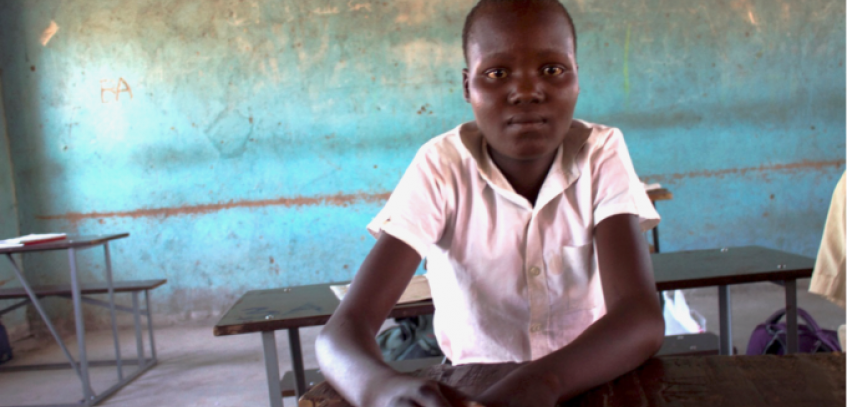In the Masvingo province of Zimbabwe, rainfall is minimal and uncertain. As the El Niño-induced drought strengthens its grip, teenagers such as Beauty, 13, are starting to feel the strain…
Beauty, 13, from Masvingo province, Zimbabwe, is hungry and weak.
Her community has been hard hit by the El Niño-induced drought, which has resulted in lack of food and livelihoods.
She sits in the far corner of the classroom, her eyes red shot from constant rubbing, a distraction from falling asleep. Her face is pale, her step a visible straddle.
There is no food and school is a blur of sleepy hunger.
Beauty is an orphan with three younger siblings. They live with their grandmother who depend on Beauty’s morning chores to get by each day. Beauty wakes up every day at 4am, fetches water and pounds dried corn with a stick before setting off to school.
Beauty and a number of her school mates walk 18 kilometres every day to and from school on an empty stomach in the scorching heat.
There is no food at home.
In previous years, she and her friends would feast on the Marula fruit as they walked to school, as the summer rains cooled the air, but the drought has dried out the Marula fruit, the remains eaten by birds, while the heat from below is too much to bear.
“The distance to school makes me lose hope,” says Beauty. “I sometimes feel my bones aching. The journey back home is unbearable too, especially knowing that there is nothing to cook. Some nights we go without food. After such nights, I cannot wake up to go to school, my body fails me.”
At home, the family scrounges for one meal a day, a plate of millet and green vegetables with salt and no oil.
“It’s painful to be in school,” says Beauty. “I have no-one to tell about my hunger, I stay with my old grandmother who needs my help to get food. I feel unhappy that there is no food. Sometimes, I have sharp stomach crunches, whenever I visit the toilet I pass a hot diarrhoea-like substance.”
Beauty’s education is suffering too.
“The situation is becoming worse because I know my fees are not paid and my grandmother cannot buy me any books as all the money is buying the little food she can afford. Girls like me have to stay at home during school days to look after our siblings while the mothers are away from home, engaged in petty trading or other economic activity aimed at feeding the family. I do menial casual jobs to get a few dollars to add to the money at home, I have no time to play.”
The weekends are fraught with hard work, too.
“On weekends, I fetch firewood, water gardens but the wells are getting too deep and it’s very heavy and dangerous. Some families pay me to do this, while others give me a little maize meal and salt to cook with my grandmother. Sometimes I beg from neighbours, a house each night. Everyone in the village knows my siblings and I beg food.”
The situation is so bad, many want to leave Zimbabwe says Beauty.
“Boys mould bricks and herd people’s cattle. Life is tough and many long to go to South Africa. The scorching heat is making it harder to find jobs.”
Plan International Zimbabwe is responding the El Niño situation and is providing food and nutrition aid, emergency water supply, food in schools as well as putting child protection measures in place.
Plan International Zimbabwe is committed to working closely with the government and other agencies and monitoring the status of children, families and communities in the affected areas.
Contact:
Angela Machonesa, Regional Communications Specialist (RESA); Tel: +263 772380 002; Email: angela.machonesa@plan-international.org
Notes to editors
- The Government of Zimbabwe has declared a state of disaster given the unfolding El Nino induced drought.
- It is estimated that 30% of the population are food insecure, equating 2.8 million people. It is feared it could reach 5 million in the next lean season
- Current food aid is only meeting a small percentage of those in need,
- The main rural livelihoods – cultivation, on farm labour, remittances are all reducing
- The drought is affecting the school attendance as well as access to healthcare
- Irrigation and small grains have eased the situation, however wells and boreholes are drying up and need rehabilitation










